Novus Ordo: Contemplative Women Must Change Their Lifestyles
Marian T. Horvat, Ph.D.
Francis' latest Apostolic Constitution on Women's Contemplative Life is
much more revolutionary than it might appear at first sight. Perhaps
that is why it has not received the attention it deserves from the
Catholic media, who typically try to avoid reporting the more
destructive fruits of Vatican II.
Titled Vultum Dei Quaerere (VDQ), it calls for women religious living in contemplative orders around the world to re-regulate their lifestyles and re-write their constitutions to better conform to the Vatican II guidelines and the changing modern times. The Vatican press release plainly admits VDQ is a “call to implement changes” in 12 areas of the monastic tradition, from formation to cloister and asceticism. In the long term, it is a full re-structuring of contemplative religious orders.
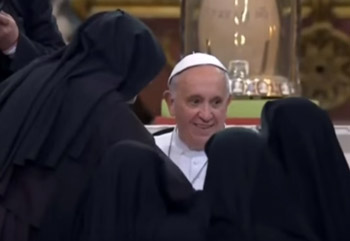
Nuns in Naples leave the cloisters to greet Francis
No more exceptions or excuses like “we are following the order’s special charisma.” The move toward centralization and modernization is mandated by the Supreme Pontiff himself and applies to every order under his jurisdiction, including the traditionalist female contemplative institutions – those linked to Fraternity St. Peter, the Institute of Christ the King, the Good Shepherd Institute and, shortly, to those dependent on the Society of St. Pius X, when it officializes its status with Rome.
Forbiddingly, Francis begins by dictating that VDQ abrogates and over-rules all past documents with norms governing the lives of religious contemplative women, including the 1983 Code of Canon Law. To make the command crystal clear, he specifically lists the more relevant documents starting with Pius XII's Apostolic Constitution Sponsa Christi (1950) to the Vatican Instruction Verbi Sponsa (1999) on the contemplative life and enclosure of nuns. (VDQ art. 1 )
Therefore, with a sweep of the hand, Francis mandates:
- All contemplative women religious orders must review their aims and rewrite their constitutions to be in better accord with Vatican II;
- All past norms and regulations governing contemplatives including Canon Law are voided;
- The contemplative women religious orders must submit unquestioningly to VDQ and await another set of guidelines to come. These new constitutions, once adapted to the new guidelines, still to be issued by the Congregation for Institutes of Consecrated Life and Societies of Apostolic Life, must be approved by the Holy See. (VDQ art. 14: §2)
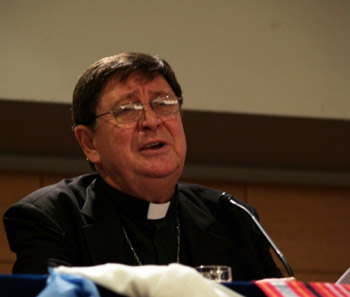
Card. Aviz insists all religious women must enter the modern world in the spirit of Vatican II
Addressing the religious formation directors at a Rome congress in 2015, he spoke harsh words against those religious who try to avoid the changes in the Church brought about by Vatican II.
“In fact, those that are distancing themselves from the Council to make another path are killing themselves – sooner or later, they will die,” Braz de Aviz said. “They will make no sense. They will be outside the Church. We need to build, using the Gospel and the Council as a departure point.” (National Catholic Reporter, “ Cardinal to religious: Those who abandon Vatican II are killing themselves,” April 9, 2015)
This is the Cardinal chosen by Francis to issue and regulate the coming specific norms that will direct the contemplative women religious in their task of adaptation to the modern world. I believe it can be fairly said that this does not bode well for the more traditional and conservative orders that have been growing in the past few decades.
Participation in liturgy & new social agenda
While Francis heaps praise on “the life of special consecration,” he is also insisting that these women religious become “women of our time.” (VDQ n. 2) For this, “special attention needs to be given to two great documents of Vatican Council II: Lumen gentium and Perfectae caritatis.”
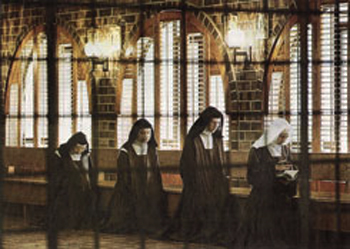
The Discalced Carmelites in Arlington in traditional habits, but praying before a stripped modern altar
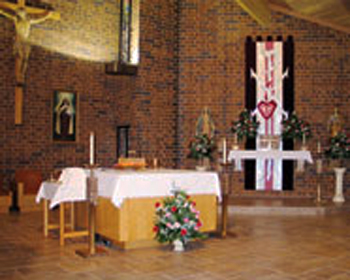
How does this translate into transforming the lives of contemplatives? More participation in the liturgy as ”the people of God,” of course, and a prayer aimed toward improving humanity vs. praise of God.
VDQ effectively asks all contemplative women to embrace the social agenda of the post-conciliar Popes, which eschews prayer for conversion to the Catholic Faith and the primary goal of contemplative life in the past: becoming victim souls to appease the just anger of Our Lord for the sins of individuals and nations.
A new signpost is erected: to offer “intercessory prayer for prisoners, migrants, refugees and victims of persecution.” These intercessory prayers must also extend to the unemployed, the poor, sick, drug addicts, AIDS victims and others in such “urgent” situations. That is to say, the contemplative sisters are to change their focus from prayer for conversion and salvation of souls to prayer for the social well-being and health of bodies. (n. 16)
They can “dirty their hands,” as this Pope akin with mud likes to say, by going in prayer to the most miserable and filthy places. The contemplative religious are thus invited to join the secular orders, who since Vatican II have taken up the mission to help mankind have a better life, disregarding one’s faith or lack of faith, and to destroy the “structures of sin” of Capitalism.
Since now the lectio divina (divine reading) has been “commended to the entire people of God,” the contemplatives must do more to share their “transforming experience of God’s word” with other religious and the laity. “Look upon this sharing as a true ecclesial mission,” Francis instructs them. (n. 19)
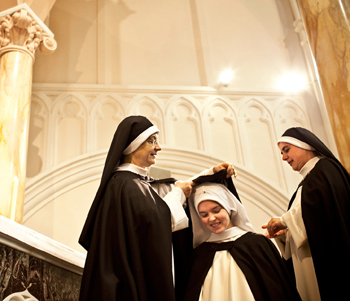
Young women in the US are increasingly attracted to the cloistered life
It is a call to a full “participation” of the “people of God' “– including the consecrated contemplatives – in the Mass, now labeled “the Eucharist.” The sisters should also take advantage of the “biblical renewal” stimulated by Vatican II, utilizing the new methods and “existential interpretation of Sacred Scriptures” in their scriptural readings and prayers (Divine Office).
But this is more than just a call to participation, DVQ mandates it: "Community celebrations must be reviewed to see if they constitute an authentic and vital encounter with the Lord." (art. 4 § 2) The new federations this document establishes will have the final word on the matter, effectively forcing the traditionalist orders into compliance with participation. Only the purposely naïve or simple-minded could imagine differently.
In the next article, I will look at the provisions of VDQ on the formation of sisters and the centralization of the contemplative communities by placing them into federations that will ensure conformity with the spirit of Vatican II.
To be continued
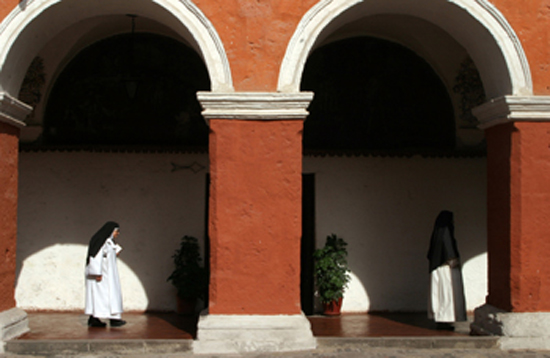
Dominican cloistered nuns in Peru leave the chapel to begin their work of making altar hosts
